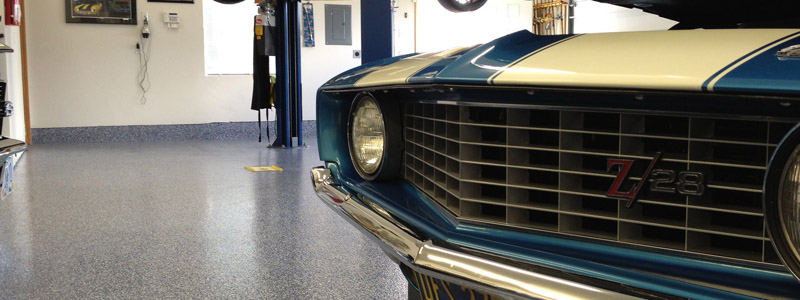Durability – Residential and Business

The popularity of epoxy flooring has caught the eye of many homeowners over the past decade. Epoxy flooring used to be reserved for business owners, who wanted a utilitarian solution for their floors. Epoxy has come a long way since then and can now be designed to maximize the owners’ priorities. In this article, we are going to discuss the durability and strength that epoxy flooring offers. This is a great chance to learn more about how this flooring functions, its installation process, and more.
This flooring works in residential spaces, but it’s obviously a great fit for our business friends too. You’ll be hard-pressed to find a floor that is easier to care for while still maintaining it’s brilliant finish. Let’s get into the details.
To answer this question effectively, you’ll need to understand how the floor is installed. After the floors have been prepped the right way, repairing any cracks or damages, a bond coating is installed first. This is followed by customizations like color, fleck, metallics, or granules. That will cure, and then another coat will be applied. After this cures, a clear topcoat will be applied. This process includes resins that act as hardeners, which directly impacts how strong your flooring will turn out. We can customize this depending on how you will be using this floor. For example, someone who is moving heavy equipment around at a business may opt for extra layers of epoxy, to give it more strength.
It’s this process that makes the floor stain, impact, fire, slip, scratch, and water-resistant and cures super hard. It isn’t porous like other floorings, which contributes to a faster-deteriorating floor. Each layer is roughly two millimeters thick. Anything less is considered an epoxy coating, which doesn’t last nearly as long and is similar to the thickness of paint. Epoxy floors have a flexural strength of more than 10,000 psi. Additional coatings can even increase that value. Here are some examples of epoxy flooring durability.
Garage – Epoxy can withstand dropped tools and the weight of your cars or motorcycles with ease. They will also stand up to chemicals that spill in the garage without any damage. We suggest tending to spills as soon as possible to preserve the longevity of your floors.
Traffic Patterns – You’ve likely seen flooring worn out in a business where everyone seems to walk the same path. You won’t get this with epoxy flooring. It can withstand the daily foot traffic that usually causes this problem.
Concrete Floor Protection – Raw concrete often breaks down if left untreated. It can crack, crumble, and separate at seams. Epoxy flooring is often used to protect concrete floors from this type of breaking down, preserving it for years.
Your floors are exposed to many different elements in a 24-hour period. All of these elements can wreak havoc on traditional floors like tile, carpet, wood, vinyl, stone, and the like. Epoxy has an advantage in that it holds up to all kinds of environmental factors. Where tile might be resistant to water, it is susceptible to scratching. Where wood can handle some casual foot traffic, epoxy can withstand years of this abuse without treatments or special maintenance. Here are some examples of how Epoxy holds up to the elements.
Sun – Epoxy is capable of being treated with UV protectants, so it doesn’t deteriorate from sun exposure. Sun often yellows materials making replacement inevitable.
Rain and Snow – Epoxy is tough as nails and isn’t a porous material. Since water can’t penetrate the floors, they end up being ideal for their water-wicking capabilities.
Debris – The build-up of debris will often damage a floor. This leads to deterioration, scratches, gooey messes, etc. Epoxy is low maintenance and easy to clean. Debris won’t get stuck is seams (it’s a seamless product) grout, since there is no grout in epoxy, our build up in cracks or crevasses of the flooring.
As noted at the start, homeowners are getting pretty savvy about using epoxy in their homes. This started with garages, but we are now seeing epoxy in all kinds of areas of the home. Need ideas? Here are a few to consider.
Garage – Keep your storage and hobby space clean and organized with epoxy flooring. Don’t let tools and your heavy toys damage an old floor.
Basements – Epoxy is a great alternative to carpet or high priced materials. It is a dream for game rooms as they can withstand plenty of spilled drinks, food, and kid’s toys.
Utility Space – Rather than leaving the bare concrete, many homeowners are asking us to epoxy their utility spaces, so they look cleaner and put together.
Laundry Rooms – Epoxy is ideal for laundry and mudrooms. Not only can everyone leave their mess on these floors with little consequence, but the dog will no longer ruin your newly cleaned floors.
Our business partners need epoxy flooring for all kinds of reasons. First of all, these floors are so easy to install, it means you won’t be shut-down for days on end. These are also more affordable floors compared to other options like wood, tile, or vinyl products. Here are some examples of where these floors perform.
Entrances – You need flooring that can withstand the heavy foot traffic coming through your doors. There is nothing worse than damaged flooring at the moment a customer walks in the door.
Retail – Aside from regular traffic patterns leaving their mark on your floors, retail shops need floors that won’t be damaged by falling hangers, dropped items, or regular cleanings.
We hope this gave you some insight into the durability of epoxy flooring, and please let us know if we can help you in the future. We would be thrilled to install your new epoxy floors.
